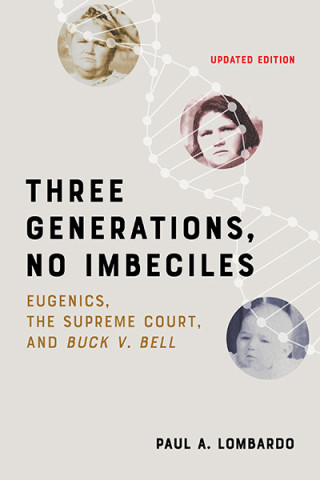
Reviews
Law professor and historian Paul Lombardo does a superb job of revealing, for the first time, all the facts in the infamous Buck v. Bell case of the 1920s, the Supreme Court decision ratifying Virginia's compulsory sterilization of 'feebleminded' people.
Overall, a fascinating book on one of the darker decisions in US law. An excellent addition to collections on US constitutional law, history, and reproductive rights.
For almost 30 years, Lombardo has tried to uncover the full story of the wrongs.
Highly recommended for academic, public, and law libraries.
An engrossing look at a shameful case.
Lombardo tells a compelling and heavily documented story of injustice to society's less fortunate citizens. His sympathy for the abused is evident, but that does not turn Three Generations, No Imbeciles into a polemic... Armed with knowledge from this excellent book, we can hope we never return to the mistakes of our past.
The book is lucidly written, well researched, thorough, and provocative... Three Generations, No Imbeciles is a must read for anyone who wants to understand the historical context of Buck v. Bell and its implications for ethics, law and public policy.
Lombardo reminds us that the same incentives to improve public health and lower tax burdens exist today.
Startling.
A sad and fascinating book... With his legal and historical background, Lombardo is particularly suited to give us a book that explains a surprisingly ignored injustice, its antecedents and consequences, and helps us to think about the ongoing struggle to find a healthy balance between privacy and government power.
This book is a legal and historical masterpiece, combining meticulous ethical analysis with a liveliness that belies its scholarly roots and exhaustive footnotes and research.
Compelling and well-researched... Three Generations, No Imbeciles gives Carrie Buck's long-untold story the attention it deserves.
In a very readable 279 pages, Paul A. Lombardo sets forth the facts about the eugenics movement in the United States.
Meticulously researched... As Lombardo conclusively demonstrates, those who sought to have Buck sterilized did not let the facts get in the way of the story the law required them to tell.
Meticulously detailed and researched history... this book is enjoyable, thought provoking, and troubling in equal measure. I highly recommend it.
Three Generations provides valuable, new, and timely revelations for students and professional scholars across many disciplines.
Most thorough examination to date... Readers will be both intrigued and disturbed by what they encounter.
What makes Lombardo's analysis so important is that issues about the fate of our mutant genes, about the use of technologies to monitor pregnancies at risk for birth defects, and alternatives to relying on chance alone are subverted by our fear of eugenics.
The struggle for justice goes on. Bioethicists typically ask 'ought' questions, but not all follow up with activism. More bioethicists should accept the social activist role. Paul Lombardo demonstrates exactly how it can be done.
Heartbreaking and riveting... There is likely to be no better account of Buck v. Bell than Lombardo's book.
A remarkable work of investigation and narrative synthesis, Lombardo connects Buck v. Bell to a broader debate over the place of eugenics in American life and law... Having amassed over two decades of research, including interviewing Carrie Buck, Lombardo is uniquely qualified to tell this story.
Three Generations, No Imbeciles manages to be both a meticulously researched work of history and a compelling story.
A powerful commentary on the dangers of politicized medicine and social engineering.
This painstakingly researched book will surely be the definitive study of Buck v. Bell for many years to come.
As a historical endeavor, it is rich and rewarding, permitting the reader a broad understanding of the social, cultural and legal context for the case that inspired Oliver Wendell Holmes' famous quotation, 'Three generations of imbeciles are enough.'... Equally important as the excavation of this history is the manner in which Lombardo's writing surfaces the emotional consequences of fertility-related policies.
Lombardo does an excellent job of meticulously laying out the sham nature of Buck v. Bell, and by the end of the text, the reader is left with no doubt that the case, which has never been overturned, was mired in deceit... Fascinating nuggets of racial politics, class inequality, and fear of the female body.
Lombardo convincingly shows that the eugenics of the 1920s, despite professional reversals and government apologies, still echoes in discussions of designer babies, grumbling about the costs of social programs and attempts to calculate the financial value of life.
This book is suitable for any audience interested in the history of the eugenics movement in the United States.
Three Generations, No Imbeciles chronicles Buck's tragic life and reviews the larger history of American eugenics in a moving narrative that will appeal to a broad audience of lay readers interested in controversies over reproductive rights, public health, science, and the law.
Compelling... brilliant... and refreshing.
Lombardo does full justice to this incredibly important and heartbreakingly tragic Supreme Court decision. His book places in stark relief a horrific miscarriage of justice and shows in full detail how the power of the judicial system can be used to undermine, corrupt, and ultimately destroy any vestige of equal protection under the law for poor, defenseless people in our society. It is a 'must read' for anyone who cares about the rule of law and the cause of social justice.
Book Details
Preface to Updated Edition
Introduction
Prologue: The Expert Witness
1. Problem Families
2. Sex and Surgery
3. The Pedigree Factory
4. Studying Sterilization
5. The Mallory Case
6. Laughlin's Book
7. A
Preface to Updated Edition
Introduction
Prologue: The Expert Witness
1. Problem Families
2. Sex and Surgery
3. The Pedigree Factory
4. Studying Sterilization
5. The Mallory Case
6. Laughlin's Book
7. A Virginia Sterilization Law
8. Choosing Carrie Buck
9. Carrie Buck versus Dr. Priddy
10. Defenseless
11. On Appeal: Buck v. Bell
12. In the Supreme Court
13. Reactions and Repercussions
14. After the Supreme Court
15. Sterilizing Germans
16. Skinner v. Oklahoma
17. Buck, at Nuremberg and After
18. Rediscovering Buck
Epilogue: Reconsidering Buck
Afterword: Looking Back at Buck
Acknowledgments
Appendix A: The Supreme Court Opinion in Buck v. Bell, by Justice Oliver Wendell Holmes Jr.
Appendix B: Virginia Eugenical Sterilization Act, 1924
Appendix C: Laws and Sterilizations by State
Appendix D: Carrie Buck's letters
Notes
A Note on Sources
Index






